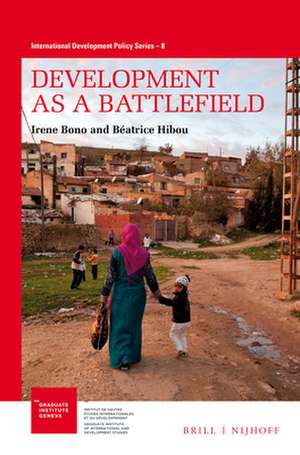Development as a Battlefield: International Development Policy, cartea 8
Editat de Irene Bono, Béatrice Hibouen Limba Engleză Paperback – 23 aug 2017
Contributors include: Fariba Adelkhah, Yasmine Berriane, Irene Bono, Ayşe Buğra, Raphaëlle Chevrillon-Guibert, Anouck Gabriela Côrte réal-Pinto, Nadia Hachimi Alaoui, Béatrice Hibou, Adriana Kemp, Nora Lafi. Talia Margalit, Marie Vannetzel, Elena Vezzadini, and Merieme Yafout.
Preț: 459.18 lei
Preț vechi: 540.20 lei
-15% Nou
Puncte Express: 689
Preț estimativ în valută:
87.87€ • 91.97$ • 73.13£
87.87€ • 91.97$ • 73.13£
Carte indisponibilă temporar
Doresc să fiu notificat când acest titlu va fi disponibil:
Se trimite...
Preluare comenzi: 021 569.72.76
Specificații
ISBN-13: 9789004349520
ISBN-10: 9004349529
Dimensiuni: 155 x 235 mm
Greutate: 0.5 kg
Editura: Brill
Colecția Brill | Nijhoff
Seria International Development Policy
ISBN-10: 9004349529
Dimensiuni: 155 x 235 mm
Greutate: 0.5 kg
Editura: Brill
Colecția Brill | Nijhoff
Seria International Development Policy
Cuprins
Foreword
Preface
List of Illustrations
List of Acronyms and Abbreviations
Notes on Contributors
1 Development as a Battlefield
Irene Bono and Béatrice Hibou
2 Two Lives of Developmentalism: A Polanyian View from Turkey
Ayse Buğra
3 Workers vs Machines: Ottoman Tunis between Industrialisation and Colonisation
Nora Lafi
4 ‘An Uphill Job Demanding Limitless Patience’. The Establishment of Trade Unions and the Conflicts of Development in Sudan, 1946–1952
Elena Vezzadini
5 The Activities of Adl Wal Ihsane in the Neighbourhoods. How to Build a ‘Non-Legal’ Consensus from a ‘Tolerated’ Conflict
Merieme Yafout
6 War and State (Re)Construction in Afghanistan: Conflicts of Tradition or Conflicts of Development?
Fariba Adelkhah
7 Resisting Neo-Liberal Skylines: Social Mobilisations and Entrepreneurial Urban Development in Tel Aviv
Adriana Kemp and Talia Margalit
8 A ‘Time’ to Act: The 2015–20 Development Plan for Greater Casablanca
Nadia Hachimi Alaoui
9 The Muslim Brotherhood’s ‘Virtuous society’ and State Developmentalism in Egypt: The Politics of ‘Goodness’
Marie Vannetzel
10 Development and Countermovements. Reflections on the Conflicts Arising from the Commodification of Collective Land in Morocco
Yasmine Berriane
11 Charity and Commercial Success as Vectors of Asymmetry and Inequality: The Unconceptualised Elements of Development in Islamist Sudan during the First Republic
Raphaëlle Chevrillon-Guibert
12 A Neo-liberal Exception? The Defence Industry ‘Turkification’ Project
Anouck Gabriela Côrte Réal-Pinto
Index
Preface
List of Illustrations
List of Acronyms and Abbreviations
Notes on Contributors
Introduction
1 Development as a Battlefield
Irene Bono and Béatrice Hibou
Part 1: Conflicts that Create Consensus
2 Two Lives of Developmentalism: A Polanyian View from Turkey
Ayse Buğra
3 Workers vs Machines: Ottoman Tunis between Industrialisation and Colonisation
Nora Lafi
4 ‘An Uphill Job Demanding Limitless Patience’. The Establishment of Trade Unions and the Conflicts of Development in Sudan, 1946–1952
Elena Vezzadini
5 The Activities of Adl Wal Ihsane in the Neighbourhoods. How to Build a ‘Non-Legal’ Consensus from a ‘Tolerated’ Conflict
Merieme Yafout
Part 2: Consensus as An Expression of Conflict
6 War and State (Re)Construction in Afghanistan: Conflicts of Tradition or Conflicts of Development?
Fariba Adelkhah
7 Resisting Neo-Liberal Skylines: Social Mobilisations and Entrepreneurial Urban Development in Tel Aviv
Adriana Kemp and Talia Margalit
8 A ‘Time’ to Act: The 2015–20 Development Plan for Greater Casablanca
Nadia Hachimi Alaoui
9 The Muslim Brotherhood’s ‘Virtuous society’ and State Developmentalism in Egypt: The Politics of ‘Goodness’
Marie Vannetzel
Part 3: The Definition of Legitimate Conflicts
10 Development and Countermovements. Reflections on the Conflicts Arising from the Commodification of Collective Land in Morocco
Yasmine Berriane
11 Charity and Commercial Success as Vectors of Asymmetry and Inequality: The Unconceptualised Elements of Development in Islamist Sudan during the First Republic
Raphaëlle Chevrillon-Guibert
12 A Neo-liberal Exception? The Defence Industry ‘Turkification’ Project
Anouck Gabriela Côrte Réal-Pinto
Index
Notă biografică
Irene Bono is Assistant Professor of Political Science at the University of Torino, Italy. She is also research associate at the Mohamed VI Polytechnic University in Rabat, Morocco. Her research interests focus on the government of inequality and the role of non-institutional actors in the formation and transformation of the state.
Béatrice Hibou is CNRS Senior Research Fellow at the Centre d’Études et de Recherches Internationales (CERI) in Paris, France. She is co-director of the Centre de Recherche, Économie, Société et Culture, Mohamed VI Polytechnic, University of Rabat, Morocco. Her comparative research in political economy focuses on the political significance of economic reform, state trajectories and the exercise of domination in Africa and Europe, from a Weberian perspective.
Béatrice Hibou is CNRS Senior Research Fellow at the Centre d’Études et de Recherches Internationales (CERI) in Paris, France. She is co-director of the Centre de Recherche, Économie, Société et Culture, Mohamed VI Polytechnic, University of Rabat, Morocco. Her comparative research in political economy focuses on the political significance of economic reform, state trajectories and the exercise of domination in Africa and Europe, from a Weberian perspective.











